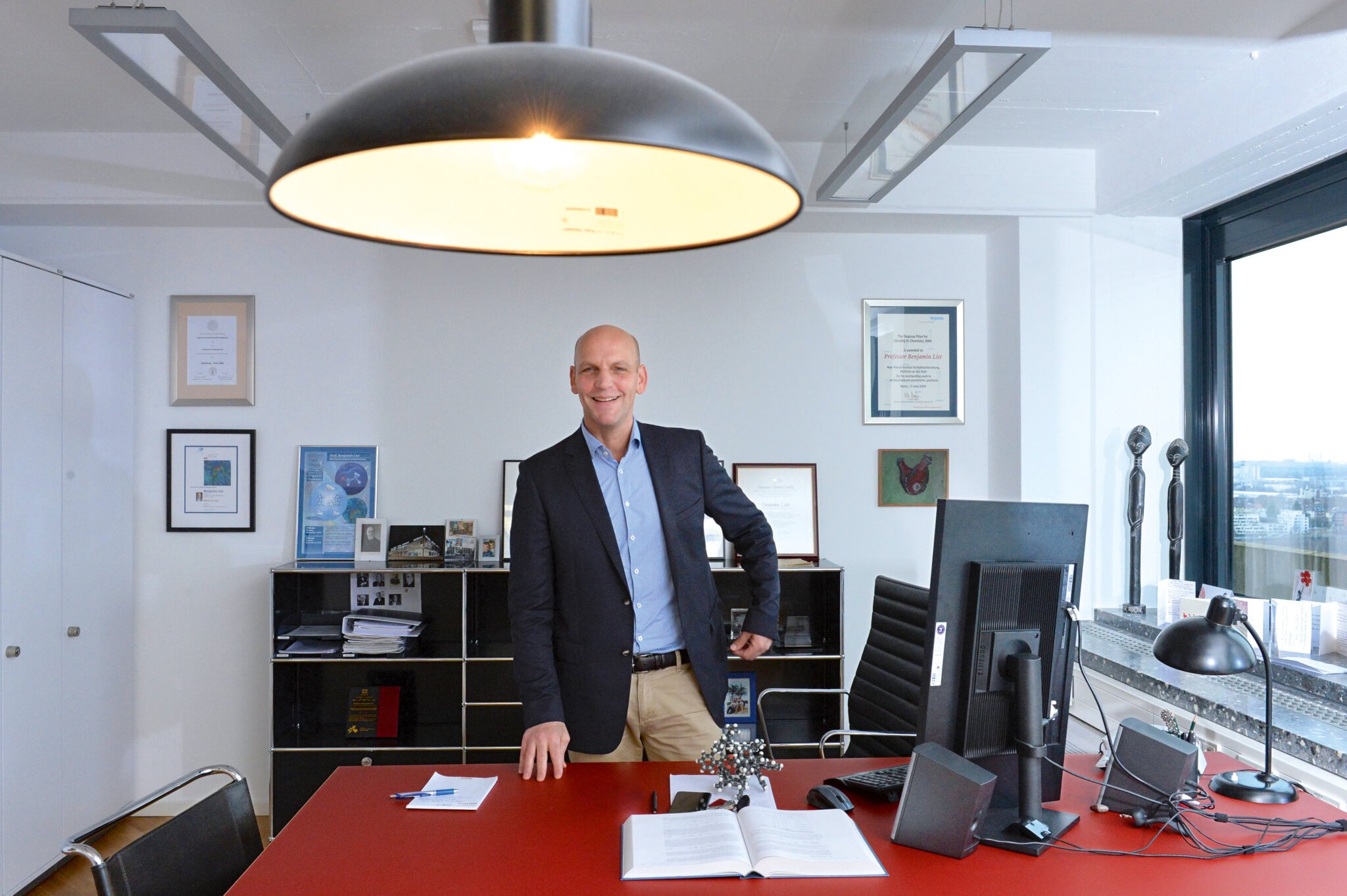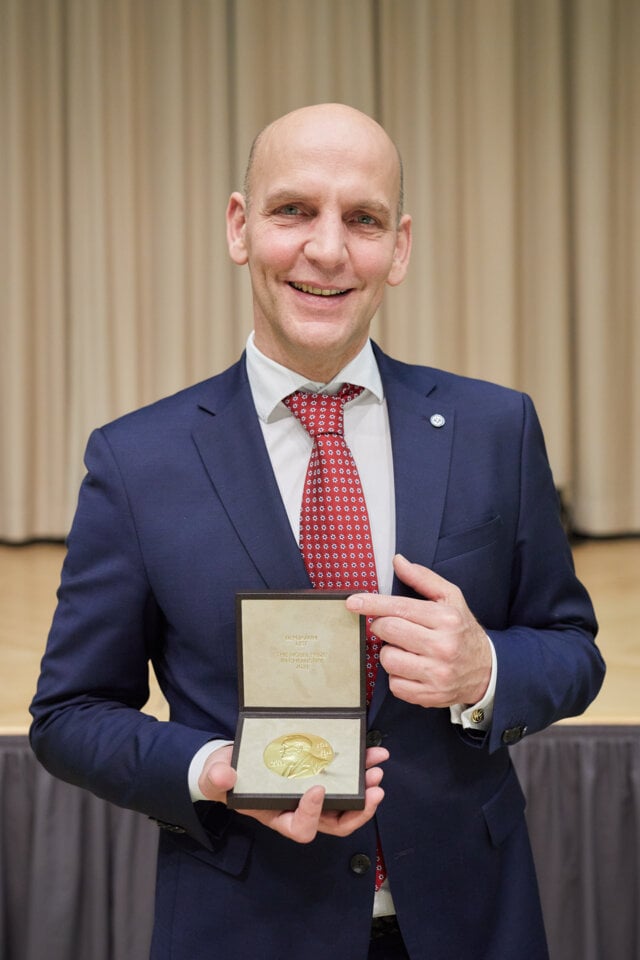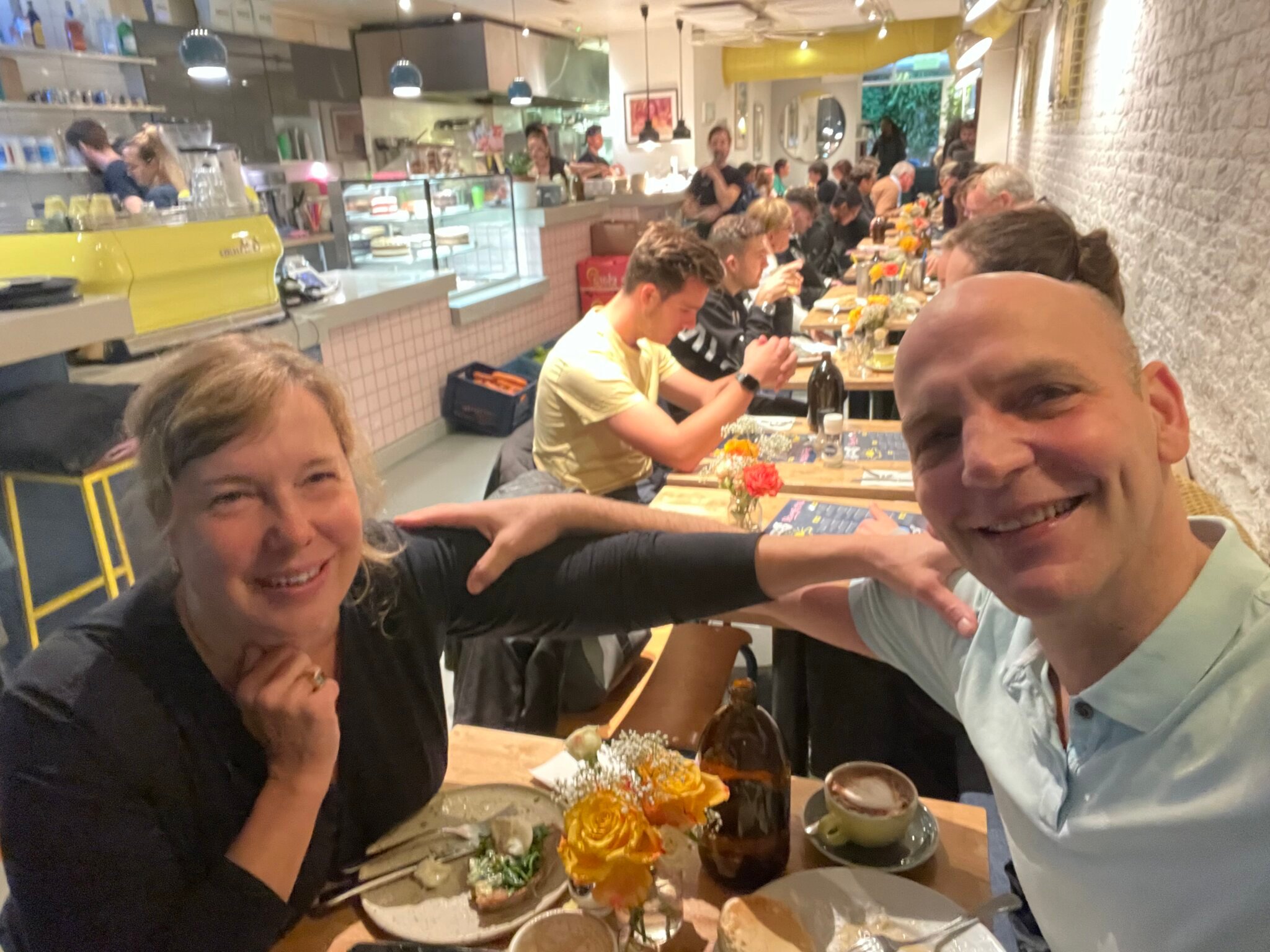“We need to represent the whole diversity of all humans in science”
Interview with Benjamin List, February 2022
On 8 February 2022, nobelprize.org spoke to chemistry laureate Benjamin List on the meaning of life and how important diversity is in science. He also told us about one of the most beautiful moments in his life – the moment he arrived at his university after finding out he had been awarded the Nobel Prize in Chemistry.
Where does your passion for chemistry come from?
Benjamin List: I think, in general, that I’m kind of the enthusiastic person when I’m into something I’m very passionate and enthusiastic about it, I think I’ve always been like this as a child already. This passion for chemistry came when I was really young, like 11 years old or so. I had this, I have to admit, wrong idea that chemists know everything, they’re like enlightened beings, they understand the universe, the world and everything. Of course, the physicists now in the society always make fun of me for that wrong understanding because they think it’s the physicists that understand the world. Which is also not true because neither chemists nor physicists really understand the world and the universe and have the answers to the big questions that I had at the time when I was 11 years old. So anyway, that’s how I stumbled into chemistry. When I realised I don’t receive the answers there, it was already too late and I was hooked and I loved it. I loved making gun powders and stuff like that. You know, the usual stories.

Chemistry laureate Benjamin List at his office.
Photographer: David Ausserhofer
What advice would you give to any young up-and-coming researchers?
My advice would be to follow your enthusiasm. That’s my number one advice. I always tell this to everybody. I was always hopeful that I can make a big discovery. Most of us in this world of science dream of that and maybe also secretly at the back of our minds we also dream of receiving a Nobel Prize at one point. When you are really interested in this and making really an impact, then you should be aware that the time when you have a revolutionary idea has to feel lonely, by definition almost. It cannot be the mainstream. If it’s going to be the next big revolution, it will certainly not be the mainstream. And yet there is this 10% when they have just finished their postdoc and then they start their independent research. There is this tendency. “I want to do something that everybody else wants to do. I want to be part of the community,” but that is detrimental. I would argue to do scientific revolutions, something you should keep in mind is this loneliness you have to be able to hold.
What do you think has made it possible for you to cope with that loneliness?
I don’t know. I have to say I was really frightened at a certain point in the early days of my career. I was pretty nervous. I felt like I’m the only one in the world right now who’s doing this kind of research. And then of course the question is, “is it because everybody else is smarter and they already know this is kind of not a good idea or is it maybe a scientific, revolutionary concept that I’m following up upon?” So I mean, you have to also be aware that it’s a required condition if you have a revolutionary idea to feel lonely. I would really say that it is a sufficient condition. So many people feel lonely because they have silly ideas. In my case, I was really lucky that the success came so early. It was my very first independent scientific experiment. I wonder how long I would have survived in that risky environment if the first few months wouldn’t have given success.
What qualities do you think successful scientists need?
Curiosity is important. We really have to burn for what we are doing. Enthusiasm, I have mentioned, it’s the most important driving force for all of us, not only scientists. And yeah, passion. I think also an openness. Because after all, it’s not us who shape or create the world and the universe, but we try to understand it. So we have to be a little bit open to surprises and don’t enforce new ideas onto the reality. It’s not going to work.

The Nobel Prize medal and diploma were presented to chemistry laureate Benjamin List at Harnack House, Max Planck Society for the Advancement of Science in Berlin, Germany on 7 December 2021.
© Nobel Prize Outreach. Photo: Bernhard Ludewig
You often also speak about your team and I know that after the award, you hugged every single person in your team. How important is collaboration and teamwork?
The team is of course extremely important. I love this interaction with my students. I try to have this hierarchy thing as low as possible. They should never hesitate to come and engage in a discussion with me. This is very important. I always say, and it’s literally what’s happening, my door is always open for them and I want them to challenge me. I wonder if this is even something that’s a little bit typical for Germans that your students, or let’s say your coworkers, criticise you as the boss. I think it’s part of our culture. It’s a little bit different from some Asian countries, for example, where you would never criticise a superior. But I think in the end, it’s a good thing. It makes science better. We always have to be critical with ourselves. That goes along with what I said before; you cannot enforce your ideas on the reality. Reality always tells you the truth.
How do you think that we can encourage diversity in science?
I don’t know why, but in my lab right now, it feels like almost women are the majority. I think it encourages itself. Like once you have a critical group of female coworkers, then the other women dare to apply. I’ve been blessed throughout my career with awesome female students, graduate students and postdocs. In general terms, my view is that we should start as early as possible. First of all, even before we start, we should think about why do we want diversity? What is the reason we want diversity? Some people say because of justice, but I don’t agree with this argument. Our aim here in the Max Planck society, or in all top universities where we go for excellence, our aim of course is to foster top-level science. And how do we do this? By tapping into all brains on the planet, ideally, and not just into a small fraction. So that’s why naturally we need to be diverse. We need to represent the whole diversity of all humans in science, just because we want ideas. Not to be lost in talents that didn’t have an opportunity to get into science and then they became something else. So that’s why I’m totally in support of diversity in science. For example, when the kindergarten ask me, can you come and talk to our kids I go. I love to do lectures at schools. I went to a local gymnasium – that’s like a high school in Germany – and gave a talk in front of 300 ninth graders. And subsequently two of them joined us. They were kids, like 14, 15 or 16, really talented girls. I said, why don’t we do a little scientific project and you come here for weeks in the vacation or in the afternoon, or once a week to already sort of lighten the spark of science in them. And then they know, actually it seems like I can do this. That’s my approach to it. But I think we shouldn’t start at the end of the spectrum and just have a quota in hiring, for example, I’m not a great fan of that.
You seem to really enjoy being a teacher. Can you tell me a bit about what is it that you like so much about teaching?
What I like most is really the shared enthusiasm for science. So I’m enthusiastic about what I do and then I speak about it. Then I see the light in their eyes and I see, wow, they get excited. And it’s the same as what I experienced with my teachers when I was an undergraduate student in Berlin. My professor, Johann Mulzer, who I also got my PhD with, always used to be very relaxed, but one had the sense, this is like the most exciting thing in the universe that you could be doing. I don’t know how he did it. We were all attached to every word he would say. Sometimes he would casually ask a question and then the smartest guys would give the answer. And that for me, I’m very sporty and competitive – I also wanted to give cool and smart answers. So that was what brought me into organic chemistry. So I know as a teacher, we can do a lot. We can really spark the interest in students.
Speaking about being competitive, how do you like to spend your spare time? Do you do any sports nowadays?
We used to live just across a very old tennis club in Mülheim and my wife would play there and my two sons would play. After a while I felt like, “maybe I should also play a little bit,” and they were also encouraging me. So I started playing tennis, I think maybe 10 years ago or so. And now I enjoy it. I play once a week or so and it’s great fun. I also do lots of yoga in the morning, like body manoeuvres, and I enjoy this also quite a bit. It keeps you flexible, young, smart and open. So I’m open to fresh ideas every day. I think it comes from the yoga.
You received the call about your Nobel Prize when you were in Amsterdam, weren’t you? Tell us about that, you and your family were at a café?
It was really a sweet event. I went with my wife to attend a great concert in the famous concert hall they have in Amsterdam, the concertgebouw. The famous conductor, Currentzis is his name, really a rising star and they played Mala. When I was a student in Berlin, I always went to the Berlin Philharmonics. I always loved classical music. At the time they had these cheap student tickets for five mark. I still enjoy this music. So we had this day trip to Amsterdam. We went to a fancy restaurant the night before and then we went to the concert and the next morning, my wife picked a fancy cafe, not a coffee shop. As I said before, it was just a regular cafe. And we were about to have great breakfast when the phone call came.

Prof. Dr. Benjamin List with his wife Dr. Sabine List 60 seconds after the call from the Royal Swedish Academy of Sciences telling him the news about being awarded the 2021 Nobel Prize in Chemistry, 6 October 2021.
Selfie by Benjamin List
After you heard about the Nobel Prize, you were in touch with your co-laureate David MacMillan. Can you tell me a bit about that? What happened there?
Well, you know the drill, right? They call you 45 minutes before the press conference and the 45 minutes is sort of the last 45 peaceful moments in your life. That’s I think the idea, right? That’s what they grant you. But in my case, it wasn’t like this because Göran Hansson called me again, like 10 minutes later and said, “Professor List, did you happen to have the phone number of Professor MacMillan? I cannot reach him.” So fortunately I have the number and I gave it to him, but then I also sent a text to Professor MacMillan literally saying “Dave, wake up.” Then a minute later he calls me and he’s a little bit tired because it’s in the middle of the night at the east coast of the United States.
I tell him, because Professor Hansson told me I should not tell anybody about the content of the phone call before the press conference, “Dave, I just received an important call from Stockholm. And they also tried to reach you. So you better pick up.” And then he goes, “Nope, I’m sorry, Ben. I don’t think that’s real. I think that’s a prank. I have students in my group. They always make these jokes with me. And I’m really sorry to let you down.” For a moment, I was a bit confused, maybe he’s right. But I told him, “Well, if it’s a prank, it’s a really good one. I mean, they have voice imitators and they really know what they’re doing.” So we hang up and he sends another text saying, “Ben, I’m really sorry, but this is a prank. I bet a thousand dollars against this is happening.” And I said, “Okay, I take it.” He still owes me the thousand dollars now.
When you came back to your lab after receiving the news, you were greeted as a rock star. Can you tell us a bit about that feeling and that experience?
I get goosebumps when you mention it. It was really one of the most beautiful moments in my life. And it was so beautiful because of the fact that we were in Amsterdam, the people here had all the time in the world to prepare, right. And so my colleague Ferdi Schüth, our managing director right now, he was thinking, what can we do? First of all, they bought all the champagne they could get in the local areas and they bought 113 bottles. That was all that was there. We drank all of them, later of course! But he also had this idea that all the students put on their lab coats and go onto the balcony and that when I would arrive, they would all clap, and it really worked. It’s not the most beautiful place at our Institute. It’s lots of concrete and architecture from the city, but they brought so much joy and so much happiness and excitement there. That came back to me and then they saw how excited I was and that went back to them. What was so beautiful was that it was not just my group or just the scientists, but pretty much everybody from the Institute. And it gave a sense of satisfaction to the scientific support groups. The metal workers, the wood workers, the gardeners, the administrative people, they were all so excited. Finally, we see the fruit of all our work for all those years. It was really such an amazing day. I will never forget this, I’m endlessly grateful to the Nobel Foundation for that moment.
In 2004 you and your family were in Thailand during the tsunami and you had an awful experience as your son went missing. Those experiences change one’s perspective on life. How has that experience affected you and how has your life perspective changed as a result of it?
It’s an interesting question. The thing is we all crave objects, I don’t know what else to call it. Like somebody may want a Ferrari or a Nobel Prize or a great job or the perfect partner. And we think that these, I call them objects, will make us happy. But when you are in a life-threatening situation, like I wonder, for example, sometimes how the patients right now in emergency units are feeling that don’t get enough air? You have a completely different perspective, all of a sudden, what will make you happy. And you realise just the ability to breathe is already such a beautiful blessing, right? And this almost dying in the ocean, and almost losing my family, that really for several months sort of fixed me in that I lost this desire for recognition that people cite me and that I get an award and that finally my great understanding is appreciated by the world. I completely lost it. This didn’t last forever. At some point I was again ambitious and I wanted to be cited by my colleagues and I was happy to get an award, but always this remained there in the back of my mind that I know the truth. I know what is important in life. And it’s definitely not the attainment of objects, even if it’s a Nobel Prize, I shouldn’t say this right. It gave me a lot of happiness and it gave a lot of happiness to so many other people so don’t get me wrong. I so appreciate it. But deep down, I know that this is not the thing that we all crave for. It’s being able to breathe, being able to enjoy life as it is, having a coffee in the morning as the sun is rising. These are the things that really matter and that make us happy. We should just open up to this. Now that’s my message.
This interview has been edited for length and clarity.
First published: February 2022
Nobel Prizes and laureates
Six prizes were awarded for achievements that have conferred the greatest benefit to humankind. The 14 laureates' work and discoveries range from quantum tunnelling to promoting democratic rights.
See them all presented here.
